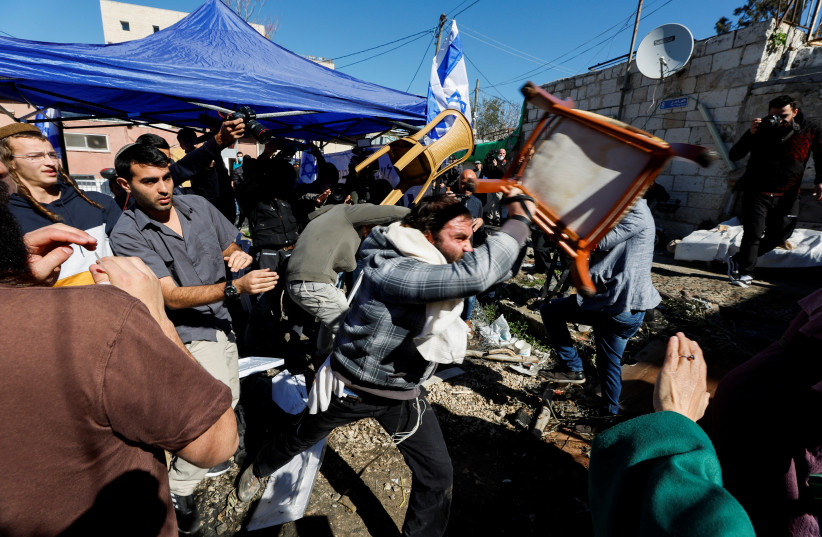Clashes have erupted this week in the flashpoint east Jerusalem neighborhood of Sheikh Jarrah. They began when far-right Israeli lawmaker Itamar Ben-Gvir opened a makeshift office in the predominantly Palestinian neighborhood, home to about 15,000 residents, following the firebombing of the home of a Jewish family over the weekend. Ben-Gvir said he would remain in this new office until the Jewish family surrounded by hostile Palestinian neighbors was provided with round-the-clock security.
For more stories from The Media Line go to themedialine.org
It is not the first time that Ben-Gvir has opened a temporary office in Sheikh Jarrah. In May, he set up shop in the neighborhood amid escalating clashes between Palestinians and Israeli forces. The Palestinians were protesting the threatened imminent evictions of 13 families living in local properties claimed by Jewish groups, and over the dispersal of gatherings for Ramadan at the Old City’s Damascus Gate, a mere 1 kilometer from the neighborhood.
The unrest in Sheikh Jarrah is said to have been a catalyst for the cross-border fighting between Hamas in Gaza and Israel for 11 days in May, which began with rockets fired from Gaza on Jerusalem. On Tuesday, unnamed senior Israeli officials gave interviews with several Israeli news outlets warning that hostilities could resume between Israel and Hamas in Gaza, sparked by the current unrest in Sheikh Jarrah. At the same time, Hamas spokesman Muhammad Hamada in a not-so-subtle threat warned that “settlers’ attacks on Sheikh Jarrah, led by Itamar Ben-Gvir, are a game of fire that could ignite all of Palestine.”
Fighting over the Sheikh Jarrah neighborhood did not start in May, however. Jewish community organizations bought some of the land there in the late 19th century, including the tomb of Simeon the Just, a high priest during the Second Temple period, and established the Jewish neighborhoods of Shimon HaTzadik and Nahalat Shimon, where they built dozens of homes. Jews had been documented as living in the area for thousands of years, by many accountings.
When Jordan took over the territory in the 1948 war, the Jewish residents fled to the Israeli side of the armistice line. In the 1950s, Jordan, with the approval of the UN agency responsible for Palestinian refugees, UNRWA, resettled Palestinian refugees who had fled from the Israeli side of the line, in the then-empty homes of the Jews. Property rights were never transferred from Jordan, the occupying power, to the residents, however.

Israel took back the area in the 1967 Six Day War. Israel soon after annexed east Jerusalem, applying its civil law there. This includes the 1950 Absentee Property Law, which effectively confiscates the property left behind by Palestinians who had fled to enemy countries, putting it under Israeli custodianship. Legislation passed in 1970 requires the Israeli custodian to release properties in east Jerusalem to their pre-1948 owners or their heirs. Advocates for the Palestinians say this law has been applied in a discriminatory manner and is only implemented in cases of Jewish ownership.
Right-wing Jewish organizations have taken title of much of that property and are working to evict the Palestinian residents. Only a few dozen Jews currently live in Sheikh Jarrah. To date, five Palestinian families have been evicted and another 20 families, comprising about 300 people, face eviction, pending Israeli Supreme Court rulings.
The Supreme Court in November offered the Palestinian families a compromise to avert eviction. The deal would have allowed them to stay on as protected tenants for at least 15 years and required them to pay a symbolic rent of about $750 annually to their Jewish landlords, the Nahalat Shimon organization that reclaimed ownership of the Jewish land. But the families have rejected the compromise, saying that it amounted to “the expropriation of the rights to our lands.”
The situation has been complicated by the eviction last month of the Salihiya family, ordered out of their home after it was seized in 2017 by the Jerusalem Municipality to build a special needs school for children of the neighborhood and the surrounding areas. The eviction, after days of protest, took place in the middle of the night and despite international outcry.
The next round of evictions and violence could come in March. But because that is right before the Muslim holy month of Ramadan, which begins on April 2, it could be postponed, Haaretz is reporting.
